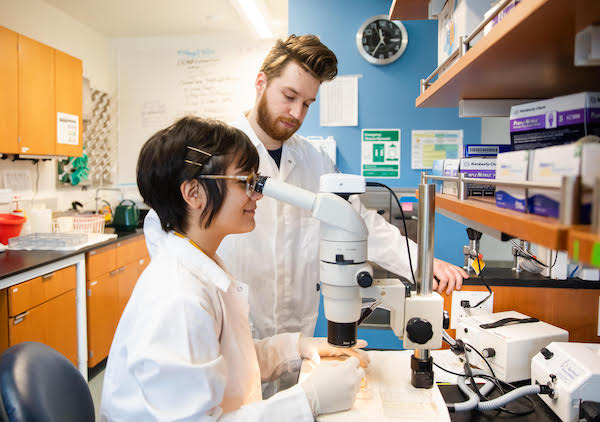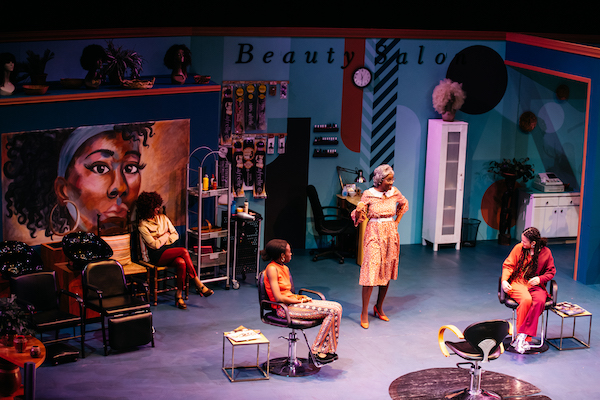Campus News
Growing Our Own – From research opportunities to the professoriate
Solidifying its commitment to increasing the diversity of its faculty, both underrepresented minorities and female faculty, last year, the University of California launched the Growing Our Own initiative.


When students come to UC Santa Cruz, the world becomes their laboratory no matter what they’re interested in studying. Research and creative activities provide the opportunity to take classroom learning and put it into practice in real world settings using deeper intellectual inquiry to find solutions, create knowledge and new means of cultural creation.
“UC Santa Cruz is creating more pathways into research, opening doors that take undergraduates into worlds they never knew existed,” Campus Provost and Executive Vice Chancellor Lori Kletzer said. As a student-centered public institution with high-impact research, there are opportunities in every academic division across campus – arts, humanities, engineering, physical and biological sciences and social sciences. “These research and artistic endeavors benefit the undergraduates, faculty mentors, and the university.”
Solidifying its commitment to increasing the diversity of its faculty, both underrepresented minorities and female faculty, last year, the University of California launched the Growing Our Own initiative. It aims to equip students to apply to graduate school, continue their research in a UC doctoral and post-doctoral program and ultimately become UC faculty members. The goal is that by 2030, over 40 percent of UC PhDs will have come from a UC or CSU campus.
A partner in this vital work, UC Santa Cruz is increasing its outreach, encouraging more students to get involved in research – the sooner, the better, especially those who haven’t been exposed to research or the careers it can lead to. Research experience is a critical component in opening doors to career opportunities and to preparing undergraduates to apply to graduate school.
“Coming to a place like UCSC enables you to do the type of research that actually gives you freedom, freedom to evolve into any direction that you come up with,” said Karlton Hester, a professor and composer in the Music Department, associate dean of diversity, equity and inclusion and director of the Digital Arts & New Media.
“Students constantly bring something new to the table, whether it’s enthusiasm or a new perspective or new ideas,” said Roxanne Beltran, assistant professor of Ecology and Evolutionary Biology. Student researchers in the Beltran Lab do fieldwork at Año Nuevo Reserve collecting data that helps monitor the demographics of the northern elephant seals. “The students’ ideas really invigorate me, and we do much better science when we do it together,”
Raquel Lozano, an undergraduate in the Ecology and Evolutionary Biology Department, recently worked on a paper with Professor Beltran on the duration and timing of molt of the elephant seals. “I by no means come from a science background or a math background, but I now feel like a scientist.”
“Having students work on the projects helps me see it with new eyes,” said Greg O’Malley, associate professor of history. “They bring new perspective. They ask questions that make me stop and rethink some of the assumptions behind the work.”
In some areas such as virtual reality, students are even ahead of their professors. “It’s great to work with undergraduate students because they’re very well informed about the newest games and the newest virtual reality technology,” said Professor Sri Kurniawan, in Baskin Engineering’s Computational Media Department.
“I came in thinking that I was going to mainly do an educational track to become a teacher and I’m leaving actually wanting to do more research,” said history major Gavin Williams. “And how I came about that was really just asking the questions I wanted to know more about to my professors even if I didn’t really think they had to do with the class. But if I felt they had the knowledge, I just asked and then eventually I started wanting to find those answers myself.”
Students can also develop their own independent research project. Nancy Chen, professor of anthropology, directs the Global and Community Health Wellbeing Fellows program and sponsors undergraduates in their independent research projects. “The journey actually takes students to places they never expected,” she said. “Sometimes it might be graduate school, other times, a new career opportunity. And through this research or other projects, they find themselves prepared in amazing ways.”
Along with growing their academic knowledge, students develop professional skills including time management, learning to work independently, problem-solving, and gaining self-confidence.
The Online Education team has put together a series of videos featuring students and faculty from each of UCSC’s five disciplinary academic divisions, showing some of the research projects undergraduates can join.
“Professors are here to help you inside and outside the classroom,” said Flynn Lloyd, who is an undergraduate studying Film & Digital Media and Environmental Studies. “They really want to not only help you get a grade, but to help make connections and help allow you to achieve your aspirations, both in research and your greater career.”
For more information on how to prepare to participate in research and join a lab or research group, visit the Undergraduate Research Opportunities website.